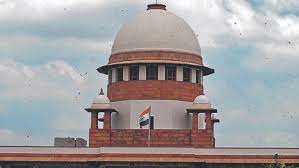The appeals are filed claiming enhanced compensation. Appeals relate to the Notification dt. 13.05.2010. The acquired lands are located in (i) Village Malpura, (ii) Village Kapriwas and Sidhrawali. Hence, they are disposed of by the Common Judgment. (Para 2)
A court, in determining the market value of acquired land as one of the factors, relies on exemplar sale deeds, decides the location/ potentiality of the land sold through a private sale, and compares the nature and neighbourhood of the land acquired. The court is guided by relevant and admissible evidence and practical or pragmatic ways of commercial transactions, suitable adjustment towards deduction for development charges and developed area. (Para 13)
The Reference Court relied on Ex. P-4/3 dt. 13.08.2008. Ex. P-4/3 is in respect of land situated in Village Malpura. The Sec. 4(1) Notification is dt. 13.05.2010. Ex. P-4/3 is anterior in point of time, and the extent of land is 12 Kanal 2 Marlas, which cannot be treated as a small residential or commercial plot. The Reference Court determined compensation after deducting 60 per cent towards development. The High Court, in our considered view, has rightly disagreed with the approach of the Reference Court. But the High Court failed by arriving at a market value of Rs. 1,21,33,320/- without factoring in an applicable deduction. We are convinced that Ex P-2 and P-4/3 are not appropriate exemplars to rely on and are taken into consideration for appreciating the upward increase in market value in the subject village. (Para 13.1)
The findings of fact recorded both by the Reference Court and the High Court are kept in our perspective viz that as on the date of acquisition, the lands under acquisition were having CLU certificate under Punjab Scheduled Roads and Controlled Areas Restriction of Unregulated Development Act, 1963. The land under acquisition cannot be completely treated as agricultural land, and at the same time, the land cannot also be treated as forming part of a developed or approved layout. The land has been in the hands of the landowners for industrial use, and therefore, the applicable deduction to the cases on hand could be 33 per cent. The incremental value of land from admitted or proved exemplars till the acquisition is evident from Ex. P-4/3 and Ex. P-Y. (Para 14)
We are convinced that the land values in Malpura Village as evidenced in Ex. P-Y dt. 15.02.2010 are increasing. Ex P-Y has been brought on record as additional evidence before the High Court. The Map filed as Annexure P-1 in SLP No. 4487 of 2022 presents a quick view of the location, distance etc. of both, the acquired land and the land covered by private sale. The extent of land covered by Ex. P-Y is 5 Kanal, 2 Marla. The land in Ex. P-Y is on the western side beyond National Highway No. 8 [Delhi-Jaipur Highway]. The land in sale exemplar Ex. P-Y is in Malpura Village. The sale consideration in P-Y is Rs. 1,42,62,445/- for 5 Kanal, 2 Marla, per acre works out to Rs. 2,23,72,463. Ex. P-Y dt. 15.02.2010 is immediately preceding Sec. 4(1) Notification dt. 13.05.2010. Therefore, we place reliance on Ex. P-Y and is an applicable exemplar for determining the market value of the land under acquisition. The above discussion takes us to the next aspect viz applicable deduction on the exemplar. (Para 15)
The acquired lands are not shown or established as agricultural land. Admittedly, substantial portions of the land under acquisition is abutting the National Highway No. 8. The area, even by the date of acquisition, is developed with industries in the proximity and has good potential for industrial use. CLU certificate discharges the initial burden of establishing that the land under acquisition is not agricultural land. Therefore, we apply the standard deduction 1/3 on exemplar value and are not persuaded to factor incremental increase on the exemplar in as much as the time gap between Ex. P-Y and Sec. 4(1) Notification is brief. Assessed as above, the market value payable to 1 acre in Malpura village is arrived as follows (Para 16)
The subject lands are acquired under one notification and the plan brought on record evidences the location and proximity to development in and around the acquired land. The belting of area for valuation would be incorrect. We reject the argument of the State. Since we have not applied incremental value on the exemplar, we deem it just to determine uniform market value to the lands under acquisition. (Para 17)
Hence, for the above reasons and discussion we allow the appeals in part and determine the market value at Rs. 1,49,14,975/- per acre for the acquired lands with standard statutory benefits. Appeals allowed in part. No order as to costs. (Para 18)
SUPREME COURT OF INDIA
2023 STPL(Web) 201 SC
[2023INSC759]
Besco Limited Vs. State Of Haryana & Others
Civil Appeal No(S) 5376 of 2023(Arising Out Of Slp(C) No(S).4487 Of 2022) With Civil Appeal No. of 2023 (Arising out of SLP (C) No.4872/2022) Civil Appeal No. of 2023 (Arising out of SLP (C) No.4996/2022) Civil Appeal No. of 2023 (Arising out of SLP (C) No.14506/2022) Civil Appeal No. of 2023 (Arising out of SLP (C) No.6893/2023) Civil Appeal No. of 2023 (Arising out of SLP (C) No.14507/2022) Civil Appeal No. of 2023 (Arising out of SLP (C) No.5574/2023) Civil Appeal No. of 2023 (Arising out of SLP (C) No.5546/2023) Civil Appeal No. of 2023 (Arising out of SLP (C) No.5549/2023) Civil Appeal No. of 2023 (Arising out of SLP (C) No.__________) (@ Dy. No(s). 10986/2023)-Decided on 23-8-2023
https://stpllaw.in/wp-content/uploads/2023/08/2023-STPLWeb-201-SC.pdf







